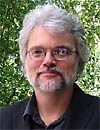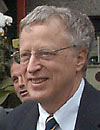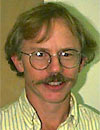New National Academy members elected today
BERKELEY – Three University of California, Berkeley, faculty members, including the campus's most recent Nobel Laureate, were elected today (Tuesday, April 29) to the National Academy of Sciences.
The new members from UC Berkeley are George A. Akerlof, Goldman Professor of Economics and co-winner of the 2001 Nobel Prize in economics; William E. Dietrich, professor of earth and planetary science; and Michael Hout, professor of sociology.
   New National Academy of Sciences members (clockwise from top left) Michael Hout, George A. Akerlof and William E. Dietrich |
The three are among 72 new members and 18 new foreign associates elected "in recognition of their distinguished and continuing achievements in original research," according to the academy. Membership in the academy is considered one of the highest honors that can be accorded an American scientist or engineer. Among the 1,922 active members and 341 foreign associates, 128 are at UC Berkeley.
Eleven of the new members are from the University of California system, including five from UC San Francisco and one each from UCLA, Santa Barbara and San Diego.
Akerlof, a member of the economics faculty for 27 years, shared the 2001 economics Nobel for contributions to the analysis of markets with asymmetric information. His research broke with established economic theory in illustrating how markets malfunction when buyers and sellers - for example, in the used car market - operate under different information. His work has had far-reaching applications in such diverse areas as health insurance, financial markets and employment contracts.
Dietrich, a geomorphologist who has taught at UC Berkeley since 1982, specializes in the evolution of landscapes, with a particular emphasis on the role of erosion and landslides. He and his laboratory colleagues have sought to quantify these processes and develop physical laws that can be used to predict them. One model now undergoing tests predicts the potential for shallow landslides. The model is serving to guide forest practices in some watersheds in the Pacific Northwest, and is being considered for use in urban landslide hazard mapping.
Hout, who came to UC Berkeley in 1985, is a world leader in the use of innovative quantitative methods to study the sociological and demographic changes that have taken place in this country in the past 100 years, including changes in social and economic equality. Using census data, he asks questions about social stratification and social mobility, sociological demography, ethnicity, education, political change, and the sociology of religion. He also looks at new ways of measuring social segregation and desegregation.
The National Academy of Sciences is a private organization of scientists and engineers dedicated to the furtherance of science and its use for the general welfare. It was established in 1863 by a congressional act of incorporation, signed by Abraham Lincoln, which calls on the academy to act as an official adviser to the federal government, upon request, in any matter of science or technology.

